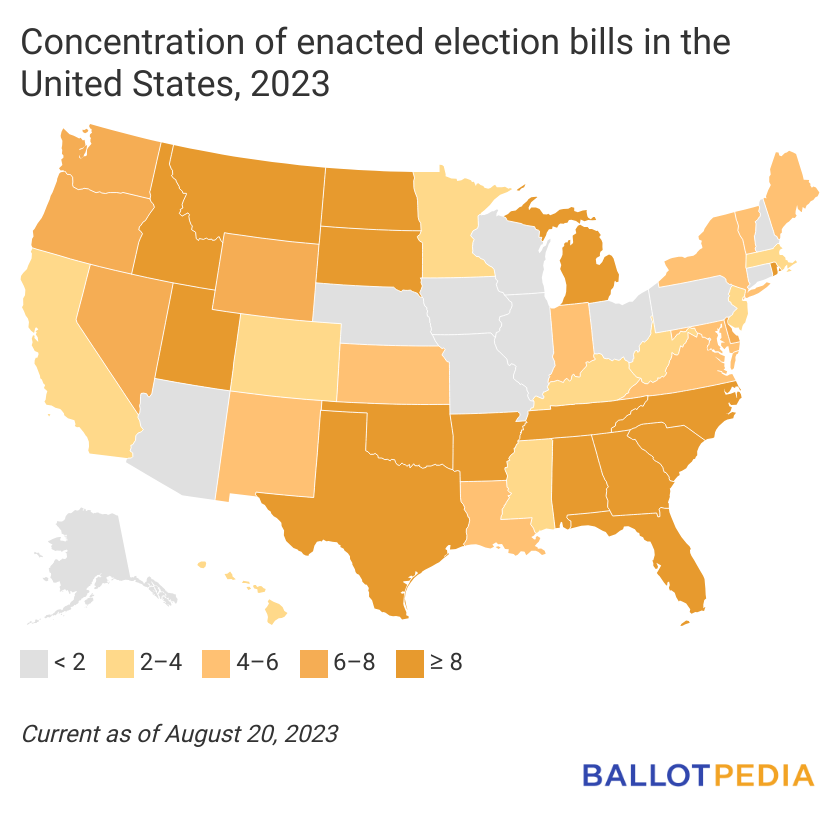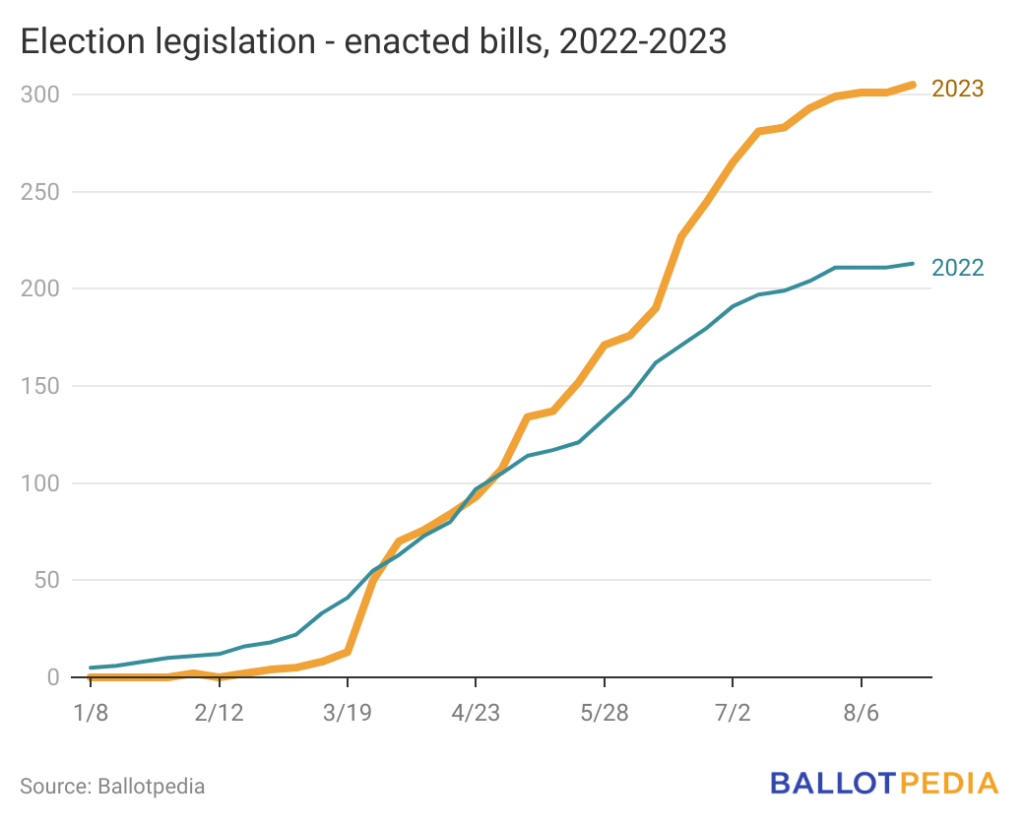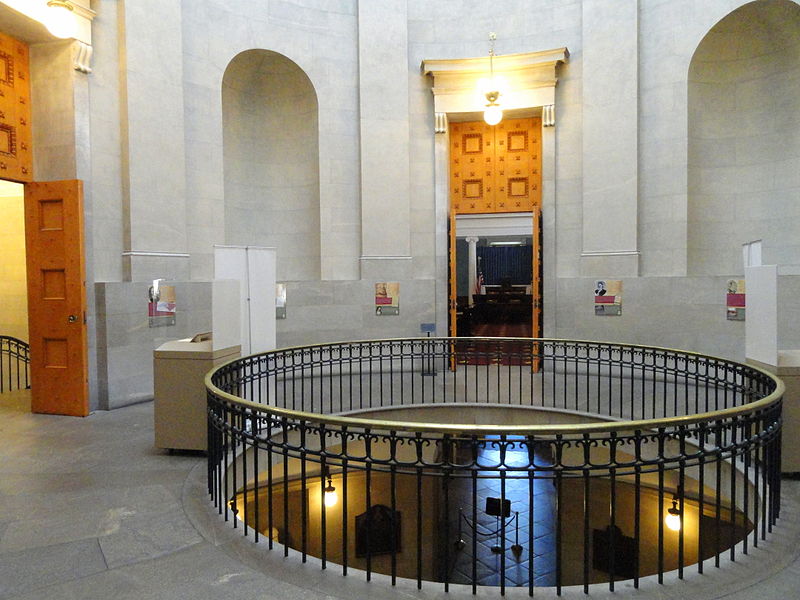As of Aug. 20, members of the North Carolina General Assembly, which includes the North Carolina House of Representatives and the North Carolina State Senate, have passed nine bills related to election administration since the beginning of the year. Of those nine bills, legislators passed one during the week of Aug. 14-20. Republicans sponsored the one bill. The bill is:
- NC S747: Elections Law Changes, Sens. Kevin Corbin (R), Warren Daniel (R), Carl Ford (R), Ralph Hise (R), Matthew Johnson (R), Paul Newton (R), and Benton Sawrey (R).
- As amended, this bill:
- Requires that ballots, election results tapes, and executed ballot applications are retained for at least 22 months after an election or longer if required by federal law.
- Prohibits the state board of elections, county boards of elections, and county boards of commissioners from accepting private donations or in-kind contributions for conducting elections or employing temporary workers. Makes an exception for donating space for use as a polling location.
- Establishes that the chair of each political party in a county may appoint two registered voters of that county as election observers at each polling location where a candidate of the party appears on the ballot and up to 10 registered voters as observers at any polling location in the county. Also establishes that the chair of each political party in the state may designate up to 100 registered voters as poll observers in polling locations across the state where a party candidate appears on the ballot. Also allows an unaffiliated candidate to designate two observers at each voting place where that candidate appears on the ballot.
- Requires a list of election observers to be submitted "electronically or in writing by noon on the business day before each observer is scheduled to serve," and stipulates to whom these lists must be submitted.
- Prohibits more than three observers from the same political party from being in the same voting enclosure at one time.
- Click the hyperlinked bill number above for more information.
- As amended, this bill:
Of the nine bills passed this year, eight have been enacted. Republicans sponsored six bills, while Democrats and a bipartisan group of legislators each sponsored one. Five of the eight bills are:
- NC H229: Stagger/Extend Terms of Town Officers/Halifax, Rep. Michael Wray (D).
- As introduced, this bill amends the charter for the town of Halifax to establish four-year staggered terms for the mayor and commissioners, align municipal elections with the general election in odd-numbered years, and elect these positions on a nonpartisan plural basis in accordance with uniform municipal election procedures. The bill also provides for the upcoming election schedule.
- NC S265: Increase Municipal Election Participation Act, Sen. Tim Moffitt (R).
- As amended, this bill:
- Provides that regular municipal elections in Flat Rock, Fletcher, Hendersonville, Laurel Park, Mills River, Columbus, Saluda, Tryon, Bostic, Chimney Rock, Ellenboro, Forest City, Lake Lure, Ruth, Rutherfordton, and Spindale (all the municipalities in Hendersonville, Polk, and Rutherford Counties) are to be held at the time of general elections in even-numbered years.
- Changes the term of office for the mayor of the Town of Tryon from two years to four years.
- Changes the term of office for the mayor and commissioners for the Town of Ruth from two years to four years.
- Provides that all members of the Polk County Board of Commissioners are elected for terms of four years.
- Clarifies all election changes to start in 2024.
- As amended, this bill:
- NC H174: W-S/Forsyth Bd. of Ed./Rural Hall Even-Year, Rep. Donny Lambeth (R).
- As amended, this bill:
- Changes the number of Winston-Salem/Forsyth County Board of Education members to nine, staggers their four-year terms, and provides for the board composition, future election schedule, and how winners will be chosen.
- Changes the town of Rural Hall to a council-manager form of government with a mayor and four council members, provides for regular municipal elections to be held in even-numbered years using the nonpartisan primary and election method, and provides for the future election schedule.
- As amended, this bill:
- NC H135: Even-Year Elections/City of Trinity, Reps. Brian Biggs (R) and Jonathan Hardister (R).
- As amended, this bill strikes outdated provisions regarding actions to take place in 2017. Additionally, the bill provides that regular municipal elections will take place at the time of the general election in even-numbered years.
- NC H57: Harmony/Love Valley Election Changes, Reps. Lindsey Prather (D), Jennifer Capps Balkcom (R), and William Ward (R).
- As amended, this bill:
- Establishes that regular municipal elections in the Town of Harmony will be held at the time of the general election in even-numbered years.
- Establishes that municipal elections in the Town of Love Valley will be held at the time of the general election in even-numbered years.
- Provides that these mayoral and town council elections will be nonpartisan and plurality based, and that elected officials will serve four-year terms with council members’ terms being staggered.
- As amended, this bill:
From Aug. 14-20, legislators passed one bill related to election administration nationally. As of Aug. 20, Texas legislators have passed the most bills this year with 35, while Alaska, Missouri, New Hampshire, Pennsylvania, and Wisconsin legislators have passed the fewest bills with zero. The state with the most enacted bills is Texas with 33, while five states have enacted none.


The General Assembly of North Carolina is scheduled to be in session from Jan. 11 to Aug. 31 this year. In 2022, North Carolina legislators passed one election-related bill in the state House. The bill was not enacted into law. North Carolina is a divided government, meaning neither party holds trifecta control.
Additional reading:


